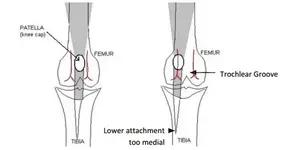Mavis
Well-known member
- Joined
- Dec 31, 2014
- Messages
- 2,005
- Reaction score
- 215
Came home for lunch today and Bambi was fine. Next thing I know, she is hopping on three legs!  hmy: I called the vet and have an appointment for tomorrow if I need it. I think it's her patella. When I took her for her well visit in January, the vet said she had luxating patellas in each back leg - one leg was a two and the other a three. Vet tech today on the phone said that it may work itself back in, which it has thank goodness. She seems okay now. Although she has always seemed to walk fine, she sits a lot and is always stretching out both legs from a standing position. I have been taking her for short walks about three times a week and her back end seems to be a little stronger (doesn't sit as much as when we first got her), but I am thinking she may need surgery at some point. I think she pretty much lived in her crate at the breeders. Anyone ever had that surgery for your frenchies? Did it work? How was the recovery?
hmy: I called the vet and have an appointment for tomorrow if I need it. I think it's her patella. When I took her for her well visit in January, the vet said she had luxating patellas in each back leg - one leg was a two and the other a three. Vet tech today on the phone said that it may work itself back in, which it has thank goodness. She seems okay now. Although she has always seemed to walk fine, she sits a lot and is always stretching out both legs from a standing position. I have been taking her for short walks about three times a week and her back end seems to be a little stronger (doesn't sit as much as when we first got her), but I am thinking she may need surgery at some point. I think she pretty much lived in her crate at the breeders. Anyone ever had that surgery for your frenchies? Did it work? How was the recovery?





















